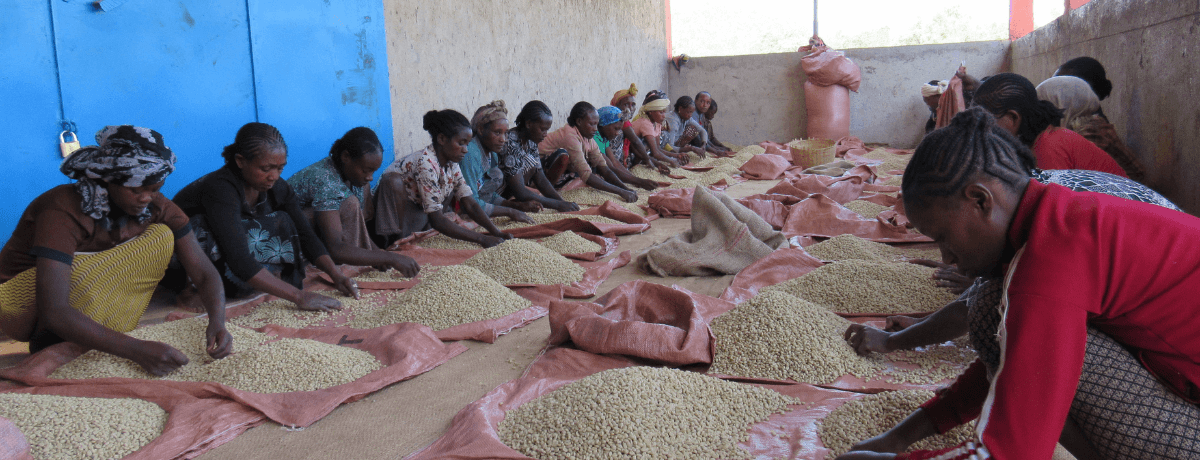
Happy to see more specialty from Yirgacheffe in 2022/23
Happy to see more specialty from Yirgacheffe in 2022/23
The Gedeo zone commonly referred to as Yirgacheffe is in the southwest of Ethiopia. It lies almost 370km long kilometers from Addis Ababa. Coffee from the region is highly sought by green coffee importers & roasters who look for high-quality green coffees. The area is subdivided into six woredas Wenago, Kochere, Yirgacheffe, Gedeb, Dilla Zuria, and Bule (Bule-Gedeo) all of which produce great coffee giving Ethiopia an iconic spot in the world coffee map.
Recently the region’s Coffee & Spice Authority announced its plans to supply more than 25866 MT of coffee to the central supplies market, which will see a 6.4% growth compared to the 2021/22 harvest.
2021/22 supplies have brought the region a gold medal ranking as the number 1 largest coffee supplier from numerous sub-origins under Southern Nations Nationalities Region(SNNPR). Among these woredas (districts) the Yirgacheffe woreda got the highest recognition for its outstanding coffee produce preparation. This is attributed to the old coffee trees replacement over 67 large farms. The second key factor lies in the district’s growing specialty coffee supplies with growing & winning representation at the Cup of Excellence-Ethiopia(COE Ethiopia).
As we wrap up the week minimum prices for Yirgacheffe are as follows. Washed Yiragcheffe Grade 1 has been set at $3.52/lb. while prices for G2 have been going 2.60$/Ib.- 2.73$/Ib.,$2.60/Ib. for G3 & 2.14$/Ib. for Natural G4 .The specialty’s red cherry prices are going at 58-60birr/kg (1.10 - 1.13 $/kg).
Like the years before we have done our due preparations with collection & washing stations and look forward to supplying you with rewarding coffees from Yirgacheffe.
2021/22 Ethiopian coffee year in retrospect
Ethiopia’s 2021/22 FY 4.9 million bags export supplies & the resulting $1.4 billion revenue have been applauded by many for consecutive months. While this milestone is undeniable some points need further attention in perfecting for the ongoing Ethiopian coffee year as EBR (Ethiopian Business Review) looks into it in retrospect.
It is to be remembered from Oumer Hussien's (Minister of Agriculture) July 10, 2022 tweet that Ethiopia exported 300,000 MT in 2021/22FY. The minister also noted the additional $500million in coffee export earnings compared to the prior years attributing the addition to both increases in prices & quantity.
Despite the government’s strong say that export earnings came primarily from volume increments, the role played by global prices has a significant contribution to these earning increments. Adding to this point, export managers of some of these Ethiopian companies shared their experiences. One of them is Feysel who manages Testis coffee which experienced 50% earning increments from the prior year in which he primarily accounts for price increments. Temesgen Cherkos who manages Hadeed Trading agrees with Feysel’s point as his company doubled in earnings due to New York Stock Exchange prices rises.
Another key matter on the table has been the practices around vertical integration which the government credits for increased exports by shortening chains. Exporters such as Feysel say there were times in which supply qualities were questionable at least uncontrolled between district exchange points. Dagmawi Yimam, manager at Kanya Export adds another subject to the concern, the unaccounted commission for ‘’middlemen” who Dagamawi says have little impact on the trade. He adds the growing tendency of suppliers to request payments before any form of the coffee’s physical transfer to the exporter has been impeding their operations. A government official on anonymity also agreed on the growing number of disputes between suppliers & exporters in which at times these two parties were advised to solve their issues through negotiation. Dagmawi remembers when the ECTA advised them to go to negotiation schemes over quality issues with a supplier.
The efficiency of vertical contracts is also questioned by some suppliers such as Girma Duka a 76-year-old coffee trader with over 5 decades of experience in the supplies. Girma expresses his experience over receiving lesser payment after delivering a washed coffee. A few others add another loophole to vertical schemes in which export coffee has been traded directly to the local market primarily through Merkato. This contributed to 2021/22 is recorded as the highest contraband coffee sales.
To some degree, the issues raised in the above encounters bring the fading importance of the ECX. Before ECX’S downhill path, it was applauded as a quality product on time for exporters while chosen as a competitive price & risk-free payment medium for the farmer.
Trading coffee, particularly Ethiopian coffee has never been easy but adapting to growing challenges & continuing to serve thousands of Ethiopian coffee friends remains the most daring commitment we exporters shoulder.
Source: https://ethiopianbusinessreview.net/
The Clinical benefits of coffee/caffeine: A latte review
A new book by Dr.Mark W Del Bello has been released from examinations & clinical studies of caffeine & coffee consumption. The book summarizes that coffee has gone from a luxury stimulant drink to a health-promoting beverage that can improve athletic performance and lower morbidity and mortality.
https://perfectdailygrind.com/2022/10/coffee-news-recap-7-oct/
ICO’s September report
The International Coffee Organization’s (ICO) September 2022 market report pointed to its composite indicator of coffee prices (I-CIP) decreasing by 0.2% in a transition from August to September 2022. September’s median prices reached 198.43/Lb. while Global exports of green beans in August 2022 reached 8.83 million bags, compared with 9.17 million bags the same month from the prior year a 3.7% decrease.
Source: https://www.gcrmag.com/i-cip-remains-range-bound-since-march-ico-report/
